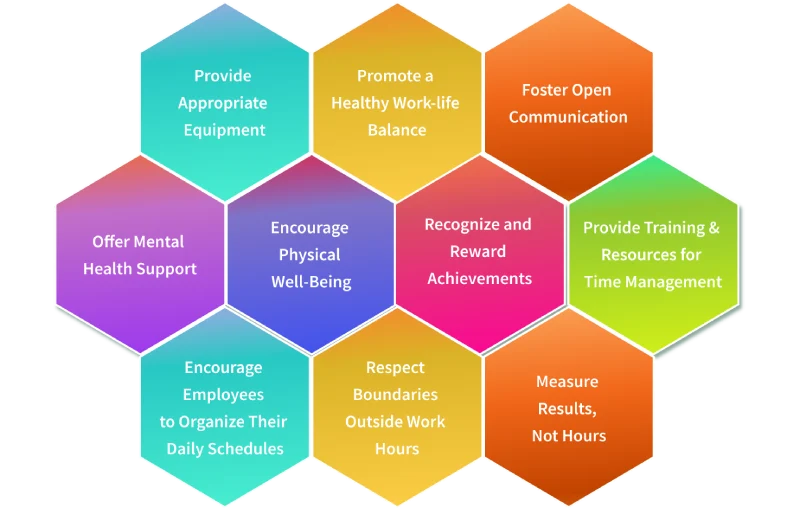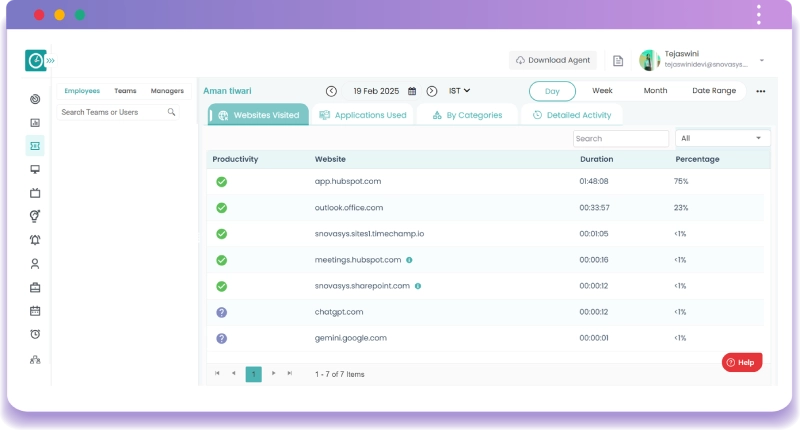If your remote employees are anxious
about working from home or feeling
stressed, it’s important to address
it before it affects their
productivity and well-being. Some
may openly share their struggles,
while others may stay silent but
that doesn’t mean they aren’t
feeling overwhelmed. As a leader,
creating a supportive and
stress-free work environment should
be a priority.
If you’re
unsure how to help them, don’t
worry! In this blog, we’ll explore
simple and effective ways to reduce
stress for your remote employees.
Let’s dive in!
Simple Ways to Reduce Stress for Your Remote Employees

1. Provide Appropriate Equipment
Many remote employees often struggle with inappropriate equipment, which can hinder their productivity and increase stress levels. It may be that they don’t have the proper tools available at home or lack the financial stability to invest in them. These challenges can definitely lead to frustration as they try to work with inadequate setups.
First, make sure your remote team has the appropriate equipment. This includes reliable computers, fast internet connection, etc. If they lack these tools, make sure to provide them. Along with these basics, try to offer stipends or reimbursements for home-office setups. For instance, you could cover costs for desks, and headphones to improve comfort and focus.
Additionally, provide IT support to help employees with technical issues. A strong support system resolves problems quickly, avoids hassles, and eases stress.
2. Promote a Healthy Work-life Balance
You might think remote work guarantees the best work life balance, but that’s not always the case! Remote work usually blurs the line between personal and work life, leading to an unpredictable and hectic life. Many remote workers say it’s hard to fully unplug after work, and they often feel expected to be available at all times. They find it harder to maintain a work life balance compared to office workers.
To prevent this issue, encourage your remote team to set clear boundaries. Suggest them to create a dedicated workspace, schedule breaks, etc. Conduct meetings to emphasize the importance of work-life balance to your employees. Keeping a healthy work-life balance helps your team feel better, avoid stress, and keep them motivated and productive for the long run.
3. Foster Open Communication
Clear and open communication is one of the most effective ways to deal with work related stress for remote employees. When employees feel free to share the things they feel, it minimizes the uncertainty that can lead to stress. Remote employees usually feel isolated as they lack face-to-face interaction, this can make them feel even more disconnected from the team.
Conducting regular team meetings, and casual “coffee talks” can help employees feel more connected and supported. These talks give them a chance to express themselves about how they feel. Moreover, actively listen and address their concerns as well. “A simple ‘How are you doing?’ marks a big impact on their overall well-being. It shows employees that they are valued beyond their work tasks, fostering a sense of care and empathy.
4. Offer Mental Health Support
It is hidden. Many people won’t
observe this issue but it holds a
big impact. Remote workers face many
mental health issues but they won’t
speak about it. They fight with
working from home burnout, anxiety,
etc. every day.
Recent
research indicates that a notable
percentage of remote employees face
mental health challenges, with
around 23% reporting
feelings of loneliness,
largely due to the absence of
face-to-face interactions.
Check out your employees every day. Schedule a session or a one-on-one meeting to communicate with them about their mental health. Offer mental health resources like counseling services, wellness apps, or workshops to make them feel good. Encourage openness and make it clear that seeking help is a sign of strength, not weakness. Offer leaves for those employees who are struggling with issues. When employees feel supported, they work better and feel happier. By giving mental health tips for working from home employees can make them feel better.
5. Encourage Physical Well-Being
Remote employees sit at their computers for hours, going from one meeting to another. They often miss taking rest or caring for their health. Sitting too much can cause back pain, eye strain, and bad posture, which can affect both their health and work.
Encourage your team members to include physical activities in their day to defeat these challenges. Give some breaks for employees for a simple walk, stretch, or a quick exercise practice. Provide virtual fitness classes or discounts on fitness apps to make it easier for them to stay active.
6. Recognize and Reward Achievements
Hardworking employees should be recognized for their efforts. Remote employees also deserve rewards for their hard work. They usually work long hours, even late at night, without thinking about the time. They work irrespective of their working hours, often ignoring their personal life.
When employees feel that their efforts are recognized, they are more likely to stay engaged and perform well which contributes to the organization’s success. Whether it’s showing appreciation through a quick thank you, a meeting shout-out, or rewards helps make the workplace feel supportive.
Besides giving praise, giving rewards can make employees feel even better. You can give bonuses, gift cards, or more time off to say thank you. Recognizing and rewarding achievements makes employees feel appreciated and keeps them motivated.
7. Provide Training and Resources for Time Management
Remote workers usually struggle to manage their time. Without an office environment, it’s easy to feel overwhelmed or forget your top priorities. Offering time management lessons helps workers decide what to do first, set simple goals, and stay on track.
To help them more, give them tools and resources for managing time. Apps for organizing tasks, planning time, and staying productive can help them work much more efficiently. Giving your remote team the right resources and training helps them focus, lowers stress, and improves their performance.
8. Encourage Employees to Organize Their Daily Schedules
A good way to help remote employees stay on track is by encouraging them to plan their day. When they know what to do, it’s easier to focus, avoid distractions, and manage their time. A simple schedule helps them decide what’s most important, set goals, and take breaks so they don’t get too tired.
Encourage your team to set time for important tasks and avoid doing too many things at once. Using tools like calendars or task apps can make planning easier. When they plan ahead, they can work better, feel more in control, and feel less stressed.
9. Respect Boundaries Outside Work Hours
Remote employees often find themselves caught in home life stress, as they’re expected to be available beyond their set hours just because they’re working from home. This constant demand can eat into their precious time with loved ones, leaving them feeling drained and disconnected. It’s a real challenge when work starts to take over their quality moments away from the screen.
To solve this issue, it is important to be strict about your working hours. Make sure that no extra work is assigned to employees after working hours. Tell them to fully disconnect when the workday ends, allowing them to recharge, and unwind. By respecting these boundaries, you are not only supporting healthier work-life boundaries but also improving your team’s energy, and motivation.
10. Measure Results, Not Hours
When managing remote teams, it’s better to look at what they get done instead of how many hours they work. Everyone works differently and has their own schedules, especially in remote jobs. It’s not fair to judge them by the time they spend online. Focus on the results they bring and how they help the team.
By shifting the focus to results, you empower your employees to work smarter, not longer. This approach fosters trust, motivates them to perform at their best, and encourages a healthier work-life balance. It’s not about how many hours they put in; it’s about what they achieve during that time.
Help your remote team stay stress-free and productive!
Try Time Champ to streamline workflows, reduce burnout, and boost efficiency effortlessly.
Signup for Free Book DemoHow Time Champ Improves Remote Work Performance
Time Champ is a time and productivity software that helps managers to manage their remote employees more effectively which ultimately reduces stress and improves work-life balance. By tracking how employees spend their work hours in real time, it gives them insights into their activities, highlighting which tasks and websites are productive and which are not. This allows employees to adjust their focus, minimize distractions, and avoid overworking.

With the ability to track both active
and idle time, Time
Champ helps employees stay
on task without feeling
micromanaged. The software also lets
businesses label tools and websites
as productive or unproductive,
ensuring that workers remain focused
on the tasks that matter.
The
detailed reports generated by Time
Champ provide managers to assess
their employees’ work patterns
and make adjustments accordingly,
leading to more efficient workdays.
As a result, it helps employees to
complete their tasks within work
hours, and enjoy a better balance
between work and personal life,
reducing stress and boosting overall
productivity.
Final Thoughts
In conclusion, keeping remote employees stress-free is key to a happy and productive team. Providing the right tools, setting clear work-life boundaries, encouraging open communication, and recognizing their efforts can make a big difference. When employees feel supported, they stay focused, work better, and enjoy a healthier balance between work and personal life.
Streamline remote work effortlessly—empower your team with Time Champ and see the results!
Signup for Free Book DemoFrequently Asked Questions
Look for changes like missed deadlines, lower quality of work, lack of communication, or avoiding team meetings. They might also seem tired, frustrated, or less motivated than usual.
Set some working hours that overlap for everyone, use tools that let people work at different times (like email or messaging apps), and be flexible with their schedules.
Offer emotional support, stay connected, and be transparent about challenges. Organize virtual team events, celebrate small wins, and provide flexibility for personal matters, helping employees feel supported during difficult periods.






